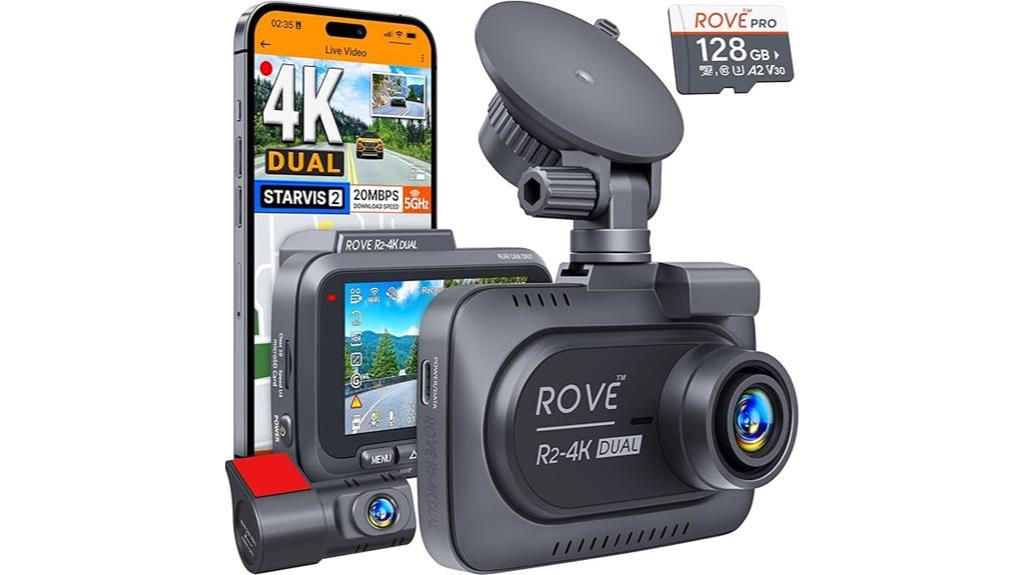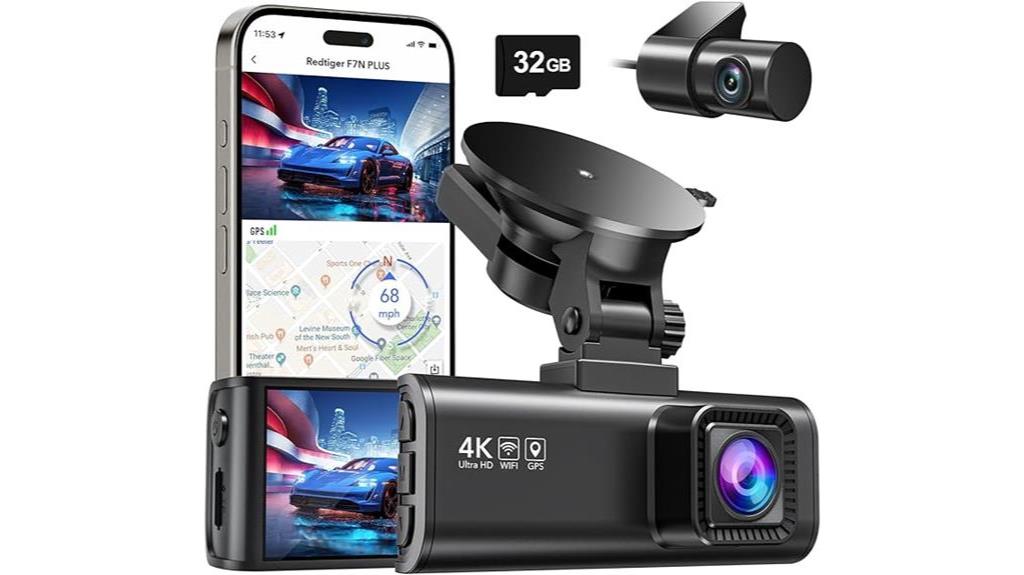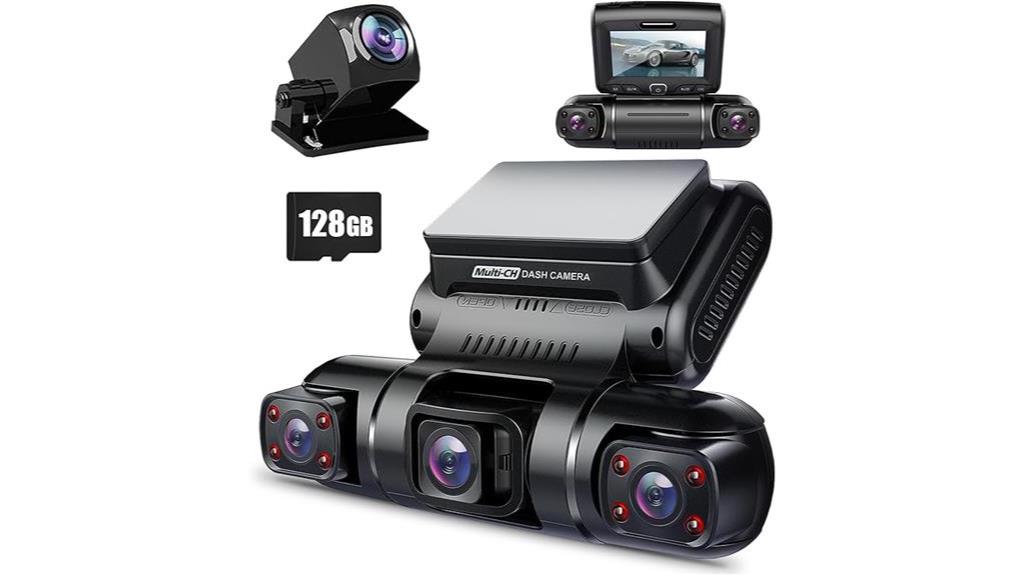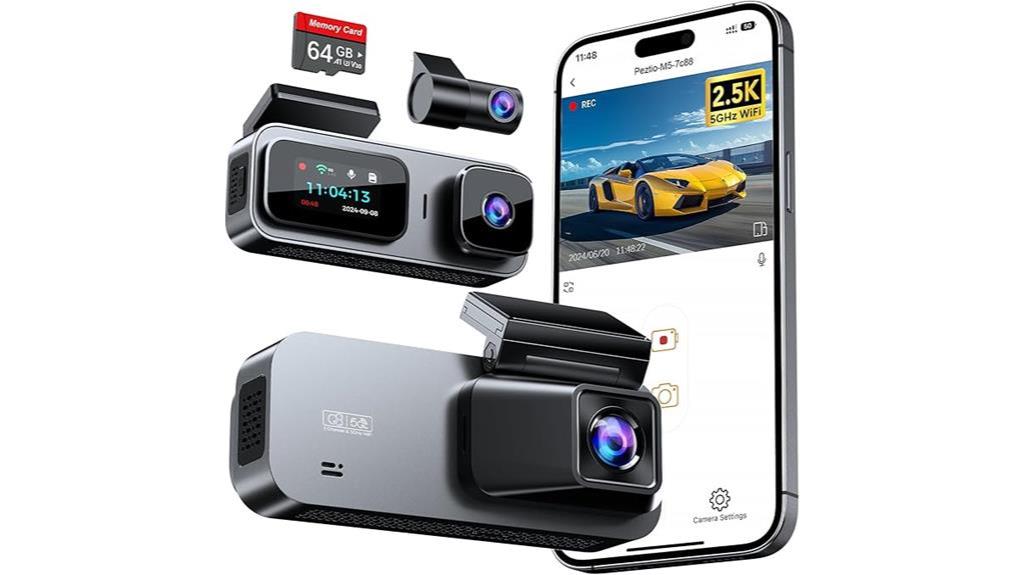If you’re looking to keep your rides safe and secure, check out the top four wireless dash cams of 2024. The ROVE R2-4K DUAL captures stunning 4K video with excellent night vision. REDTIGER’s F7NP offers ultra HD recording and a wide field of view. The PRUVEEO 360 gives you complete surrounding coverage with its four channels. Finally, the Anyski delivers solid performance with smart features like gravity sensing and 24-hour parking mode.
Each of these options brings unique advantages for your vehicle’s security, so there’s plenty more to explore about what fits your needs best.
ROVE R2-4K DUAL Dash Cam Front and Rear

If you’re someone who values both video quality and ease of use, the ROVE R2-4K DUAL Dash Cam is an ideal choice for your driving needs. This dash cam features a front camera that records at an impressive 3840x2160P resolution and a rear camera at 1920x1080P, capturing every detail on the road. With a 150° front and 140° rear field of view, you won’t miss a thing. It’s compact, lightweight, and comes with a free 128GB microSD card, expandable up to 512GB. The Sony STARVIS 2 image sensor guarantees excellent night vision, while the built-in GPS tracks your routes and speeds. Plus, installation is a breeze with included accessories. Overall, it’s a reliable companion for any driver.
Best For: Those seeking a high-quality, user-friendly dash cam with comprehensive features for both front and rear recording.
Pros:
- High video resolution: Front camera captures 4K footage, ensuring detailed recordings.
- Night vision capabilities: Equipped with Sony STARVIS 2 sensor for superior performance in low-light conditions.
- Easy installation: Comes with all necessary accessories for quick setup.
Cons:
- WiFi connectivity issues: Some users report challenges with maintaining a stable connection.
- Parking mode reliability: Concerns have been raised about the effectiveness of the parking mode features.
- Requires hardwire kit for advanced parking features: Additional purchase may be necessary for full functionality in parking mode.
REDTIGER Dash Cam Front Rear, 4K/2.5K Full HD

For those seeking high-quality video clarity and thorough coverage on the road, the REDTIGER F7NP Dash Cam is an excellent choice. With ultra HD 4K front recording and FHD 1080P rear recording, it captures every detail. Its wide-angle lenses—170° for the front and 140° for the rear—ensure I don’t miss anything. Setting it up is a breeze, and the compact design fits neatly in my car. I appreciate the built-in GPS, which tracks my speed and route. The night vision feature is impressive, providing clear footage even in low light. Although some users find the app a bit tricky, the 24/7 customer support is reliable. Overall, it’s a solid investment for safety and security on the road.
Best For: Individuals seeking a reliable and high-quality dash cam for enhanced road safety and security.
Pros:
- Ultra HD recording with 4K front and FHD rear cameras for exceptional video clarity.
- Built-in GPS tracks speed and routes, providing valuable information during journeys.
- 24/7 customer support ensures assistance is readily available for installation and operational queries.
Cons:
- Some users find the app interface confusing and difficult to navigate.
- Playback options can be tedious, making it hard to review footage efficiently.
- Video quality may be affected by external factors like weather conditions and glass cleanliness.
PRUVEEO 360 Degree View 4 Channel Dash Cam for Cars

The PRUVEEO 360 Degree View 4 Channel Dash Cam is an ideal choice for drivers seeking extensive coverage on the road. It records FHD 1080P video from all angles—front, rear, left, and right—ensuring no blind spots. I love how the adjustable front lenses capture detailed views, and the built-in GPS tracks my location, speed, and routes in real time. The time-lapse recording feature in Parking Mode is a game-changer, saving memory while I’m parked. Nighttime visibility is impressive thanks to the F1.8 aperture and infrared lights. Installation is straightforward with clear instructions, though I prefer the adhesive mount for reliability. Overall, with a solid average rating of 4.4 stars, it’s a dependable option for enhanced driving safety.
Best For: Drivers seeking comprehensive 360-degree coverage with high-quality video recording for enhanced safety on the road.
Pros:
- FHD 1080P video recording from multiple angles eliminates blind spots.
- Built-in GPS provides real-time tracking of location, speed, and routes.
- User-friendly installation with clear instructions and multiple mounting options.
Cons:
- Some users report clarity issues with license plate recognition.
- Audio recordings may have noise, affecting sound quality.
- Customer service experiences vary, particularly regarding warranty activation.
3 Channel 5GHz WiFi Dash Cam with 64GB Card

Looking for a reliable dash cam that seamlessly integrates advanced technology? The Anyski 3 Channel 5GHz WiFi Dash Cam is an excellent choice. With 2.5K front resolution and 1080P for both inside and rear views, it captures every detail clearly. The included 64GB card supports up to 256GB, ensuring ample storage for your footage. I love its smart features like 24-hour parking mode and gravity sensing, which locks vital footage during collisions. Installation is a breeze—I’ve set it up in under an hour. The intuitive app makes it easy to view and download videos. Plus, with a customer rating of 4.8 out of 5 stars, it’s clear that many users appreciate its performance and durability.
Best For: Those seeking a high-quality dash cam with advanced features and easy installation for enhanced vehicle safety.
Pros:
- High Resolution: Captures clear video with 2.5K front and 1080P inside and rear views.
- User-Friendly App: Intuitive interface for easy video viewing and downloading.
- Durable Design: Built to withstand various weather conditions and includes lifetime technical support.
Cons:
- Color Accuracy Issues: Some users reported minor problems with color accuracy in interior footage.
- Additional Hardwire Kit Needed: Parking mode requires extra hardware for continuous recording while parked.
- Limited Storage Capacity: While it comes with a 64GB card, users may need to upgrade to a larger capacity for extensive use.
Factors to Consider When Choosing Wireless Dash Cams
When choosing a wireless dash cam, you’ll want to focus on several key factors. Consider video quality and resolution, as well as storage capacity options to guarantee you capture everything you need. Don’t forget to evaluate night vision performance, installation ease, and connectivity features to find the best fit for your requirements.
Video Quality and Resolution
Choosing a wireless dash cam means considering video quality and resolution, which are essential for capturing important details on the road. Look for options like 4K (3840x2160P) or Full HD (1920x1080P) to guarantee clarity for critical elements such as license plates and road signs. A higher frame rate, ideally 30 frames per second (fps), enhances motion smoothness and minimizes blurriness during fast-moving scenes, making it essential for capturing dynamic events.
The field of view (FOV) also greatly impacts video quality. A wider angle, between 150° to 170°, provides greater coverage of your surroundings and reduces blind spots. This feature is particularly important in preventing accidents or recording incidents that may occur outside your immediate sight.
Don’t overlook low light performance, especially for night recordings. Dash cams with F1.5 or F1.8 aperture and advanced sensors will improve visibility in darker conditions, making sure that footage remains clear. Additionally, consider models equipped with HDR (High Dynamic Range) technology, which balances exposure levels in scenes with both bright and dark areas, resulting in sharper, more detailed images.
Storage Capacity Options
Video quality and resolution set the stage for capturing essential moments on the road, but without sufficient storage capacity, even the best footage can be lost. When choosing a wireless dash cam, you’ll find that storage options typically range from 32GB to 128GB microSD cards, which allow for several hours of recording. However, if you’re looking for extended recording time or higher video quality, consider models that support larger storage capacities, like up to 512GB.
Loop recording is a standard feature in most dash cams, automatically overwriting the oldest footage when the storage fills up. This means you can continuously record without needing to manage your saved files manually. Keep in mind that the video resolution plays an important role in storage needs. For instance, recording in 4K takes up considerably more space than 1080P, affecting how much footage you can store.
If you often start on long drives or want to guarantee thorough coverage, investing in larger storage options, like 256GB, can provide you with greater flexibility and minimize interruptions due to a full memory card. This way, you won’t miss vital moments on the road.
Night Vision Performance
Although capturing clear footage during the day is important, guaranteeing your dash cam performs well at night is equally essential. When choosing a wireless dash cam, look for features that enhance night vision performance. Lenses with an F1.5 or F1.8 aperture allow more light to enter, improving clarity in low-light conditions.
Advanced technologies such as HDR (High Dynamic Range) and WDR (Wide Dynamic Range) are vital for maintaining detail in both bright and dark areas of your videos. This makes it easier to read license plates and capture other important details after sundown. Some dash cams come with infrared lights that greatly enhance night vision capabilities, illuminating the surroundings without producing visible light.
Additionally, consider the video resolution; higher resolutions like 4K can capture more detail in low-light situations, making it easier to identify objects. The type of sensor also matters—look for models with SONY STARVIS or IMX series sensors, as these are designed specifically for low-light performance. Investing in a dash cam with these features will guarantee you capture clear and detailed footage, even during the darkest hours.
Installation and Setup Ease
Capturing high-quality footage at night is just one aspect of having a reliable dash cam; ease of installation and setup can greatly impact your overall experience. You’ll want a dash cam that offers straightforward, DIY installation options, ideally taking under an hour. Look for models that include clear manuals and necessary mounting accessories.
Consider dash cams with suction cup or adhesive mounts, as these provide flexibility in placement, letting you choose the best position for your vehicle. If you have a larger vehicle, opt for models that come with long rear camera cables to guarantee unobtrusive and ideal recording angles.
An intuitive user interface is essential too. A clear menu system will help you navigate settings without confusion, making setup and operation much smoother. Installation complexity can vary between models, so it’s wise to choose ones that provide visual references or detailed guides. This support can help you achieve the finest setup possible, increasing your satisfaction with the device. Ultimately, prioritizing ease of installation and setup guarantees you can focus more on the road and less on technical hassles.
Connectivity Features
When choosing a wireless dash cam, connectivity features can make all the difference in your experience. You’ll want to prioritize models with 5G WiFi connectivity, which provides faster download speeds—up to 20MB/s—allowing for seamless video transfer to your smartphone or other devices. This speed guarantees you can quickly access important footage when you need it most.
Compatibility with mobile apps is another vital feature. A user-friendly app enhances your experience by simplifying the viewing, playback, and editing of recorded footage. Look for dash cams that also include built-in GPS functionality, as this allows you to track your driving routes, locations, and speed in real-time—necessary for documenting accidents.
Advanced connectivity options are worth considering too. Some dash cams let you connect multiple cameras (front, rear, and interior) to a single app, providing extensive coverage of your vehicle. Finally, assess the app’s user interface. An intuitive design can notably improve how easily you access and manage your recorded videos, making your driving experience not just safer, but also more convenient.
Additional Safety Features
Prioritizing additional safety features is essential for anyone choosing a wireless dash cam. First, look for models equipped with built-in GPS functionality. This feature tracks your driving routes, speed, and location, which can be invaluable during accident investigations.
Next, consider advanced features like motion detection and G-sensor technology. These can automatically save significant footage during collisions or unexpected events, ensuring you have evidence when you need it most.
Parking mode options also enhance security. Features such as time-lapse recording and collision detection allow the dash cam to monitor your vehicle while parked, capturing any incidents that occur.
Additionally, loop recording capabilities are important. They overwrite the oldest footage automatically, providing continuous recording without the hassle of manual intervention.
Frequently Asked Questions
Are Wireless Dash Cams Easy to Install on Any Vehicle?
Yes, wireless dash cams are generally easy to install on any vehicle. You won’t need complicated tools or wiring, as most models come with adhesive mounts or suction cups. Simply choose a suitable location on your windshield, attach the camera, and connect it to your power source, usually through your vehicle’s USB or cigarette lighter. With user-friendly instructions, you’ll have it up and running in no time, ensuring your rides are safer and more secure.
Can I View Footage Remotely From My Wireless Dash Cam?
Yes, you can view footage remotely from your wireless dash cam. Most modern wireless dash cams come with a companion app that lets you access live feeds and recorded videos directly on your smartphone or tablet. Just make sure your device is connected to the internet. With this feature, you can keep an eye on your vehicle anytime, whether you’re at home or on the go, providing added peace of mind.
How Much Storage Do Dash Cams Typically Require?
Dash cams typically require varying amounts of storage depending on their resolution and recording settings. Generally, you’ll find that a 32GB card can store about 4-6 hours of video at 1080p resolution. If you’re recording in 4K, you might need 64GB or more for adequate storage. It’s smart to choose a dash cam that supports larger cards, ensuring you don’t run out of space during long drives or critical moments.
Do Wireless Dash Cams Work in Low Light Conditions?
Yes, wireless dash cams can work effectively in low light conditions. Many models feature night vision technology, which enhances visibility during nighttime driving or in poorly lit areas. You’ll want to look for cameras equipped with larger apertures and advanced sensors, as these improve image quality in low light. It’s important to research and choose a dash cam that specifies its low-light performance to guarantee you get clear footage when it matters most.
What Is the Average Lifespan of a Dash Cam Battery?
Did you know that most dash cam batteries last around 1 to 3 years? The lifespan of a dash cam battery can vary based on usage and features. If you’re using it constantly, the battery might drain faster. Regularly checking and replacing the battery when needed guarantees your dash cam keeps recording essential moments. To maximize its lifespan, consider parking mode settings and avoid extreme temperatures that can shorten battery life.
Wrapping Up
As you hit the road, think of a wireless dash cam as your co-pilot, always watching for potential hazards. Just like a trusty friend who’s got your back, these devices capture vital moments, ensuring you’re protected from unexpected events. With options like the ROVE R2-4K or the PRUVEEO 360, you’re not just investing in a camera; you’re securing peace of mind. So buckle up and drive confidently, knowing you’ve got a reliable guardian on board.
Ben Wilkinson is a an experienced mechanic with over 10 years of experience in the automotive repair industry. He is highly skilled in diagnosing and repairing a wide range of car-related issues, from basic maintenance tasks to more complex repairs.

